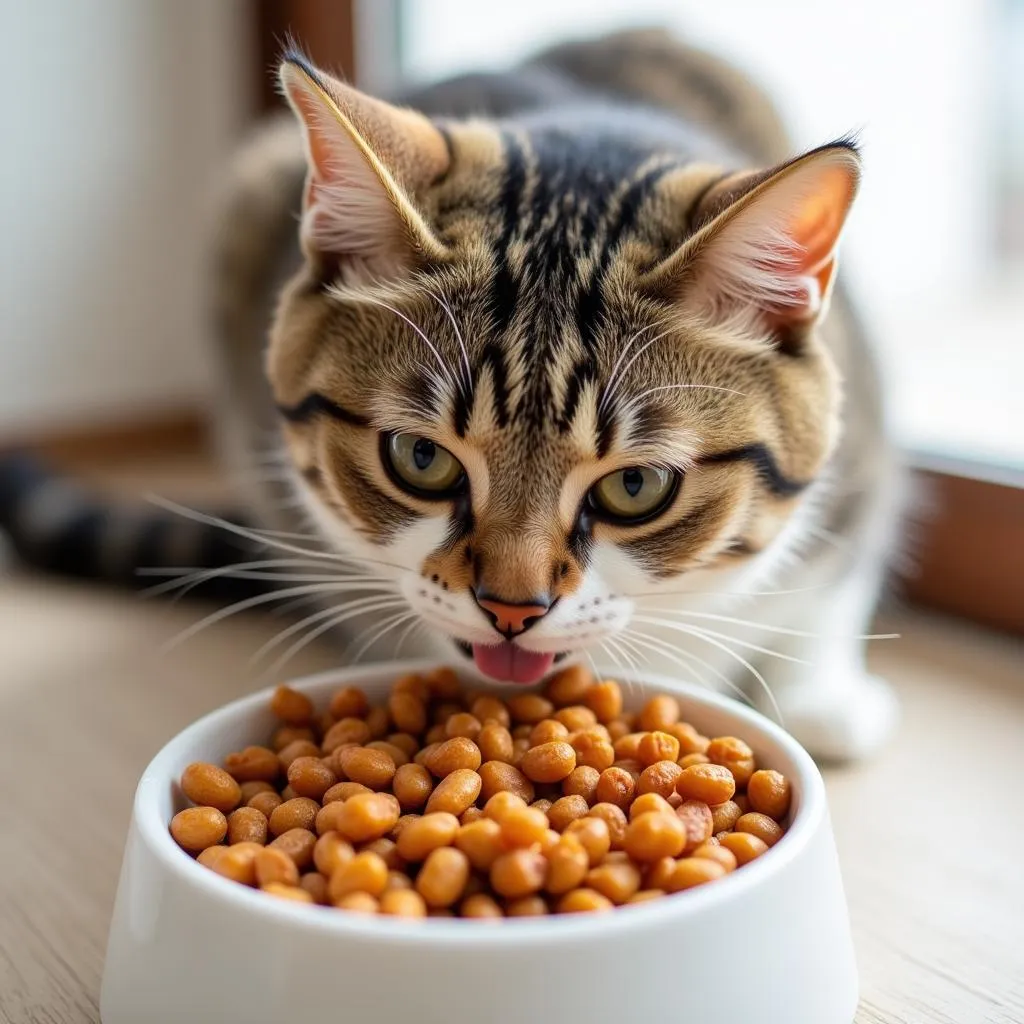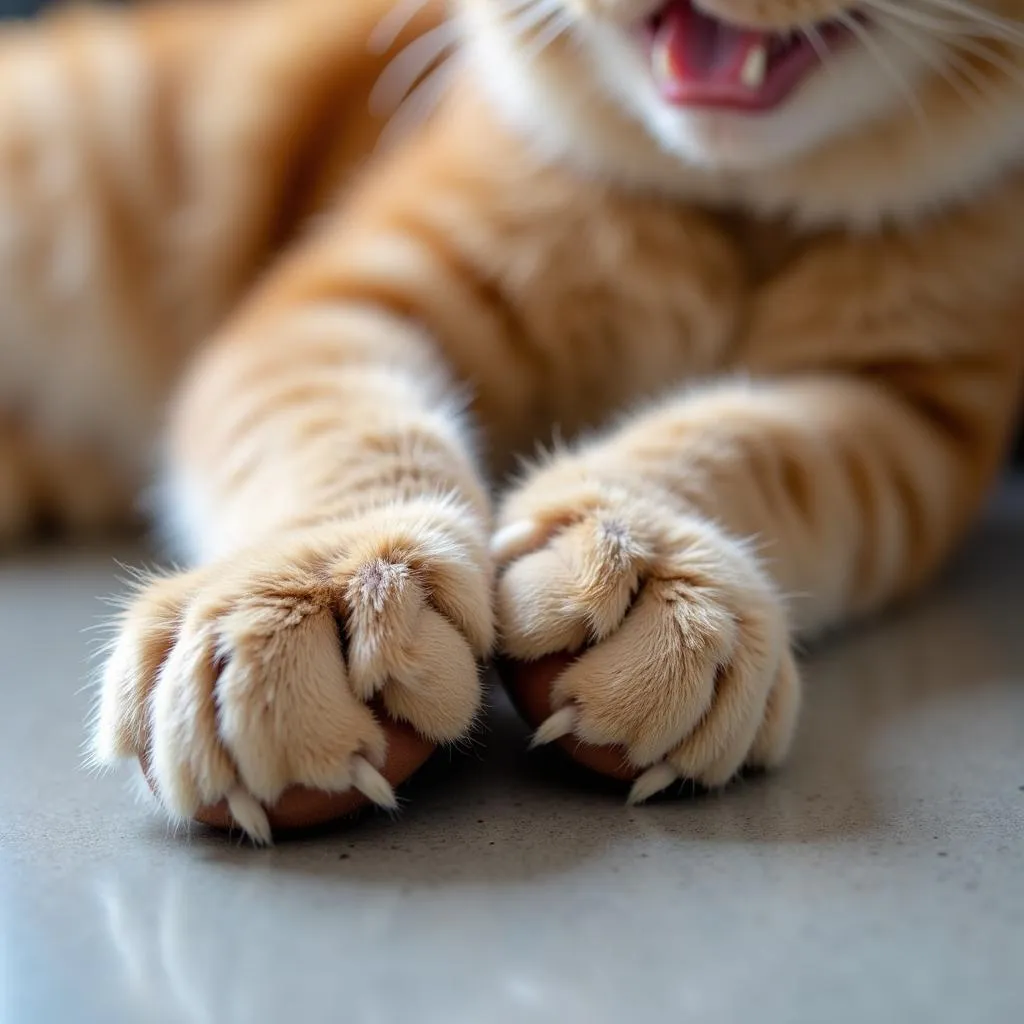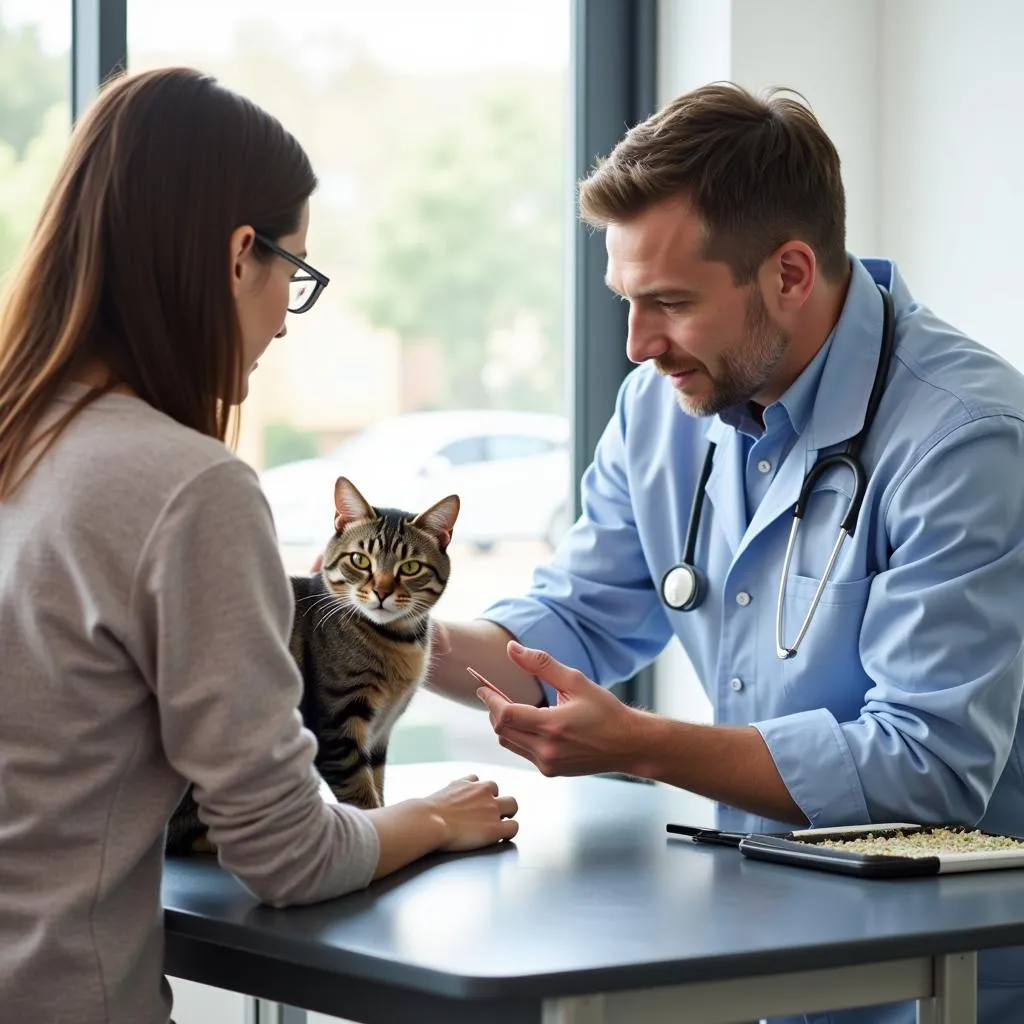Omega-3 fatty acids are essential nutrients that play a vital role in maintaining your cat’s overall health and well-being. Just like humans, cats cannot produce omega-3s on their own and must obtain them through their diet. Incorporating Cat Food With Omega 3 into your feline companion’s meal plan can provide a wide range of benefits, supporting everything from healthy skin and a shiny coat to joint health and cognitive function.
 Cat enjoying food with omega 3
Cat enjoying food with omega 3
Understanding Omega-3 Fatty Acids in Cats
There are three main types of omega-3 fatty acids: ALA (alpha-linolenic acid), EPA (eicosapentaenoic acid), and DHA (docosahexaenoic acid). While ALA can be found in some plant-based sources, cats have a limited ability to convert ALA into the more beneficial EPA and DHA. Therefore, it’s crucial to provide cat food that contains pre-formed EPA and DHA.
The Benefits of Cat Food with Omega-3
1. Healthy Skin and Coat: Omega-3 fatty acids are crucial for maintaining the integrity of your cat’s skin, acting as a barrier against moisture loss and environmental allergens. They also promote a healthy and shiny coat, reducing shedding and preventing dryness and itchiness.
2. Joint Health and Mobility: EPA and DHA possess anti-inflammatory properties that can help reduce joint pain and inflammation, improving mobility in cats suffering from arthritis or other joint conditions.
 Senior cat with improved mobility due to omega-3
Senior cat with improved mobility due to omega-3
3. Cognitive Function: DHA is a key component of brain tissue and plays a vital role in cognitive development and function throughout a cat’s life. Supplementing with DHA can support brain health, particularly in kittens and senior cats.
4. Eye Health: DHA is also essential for healthy retinal development and function. Including omega-3s in your cat’s diet can help maintain their vision and may even reduce the risk of age-related eye conditions.
5. Immune System Support: Omega-3 fatty acids contribute to a healthy immune response, helping your cat fight off infections and diseases.
Choosing the Right Cat Food with Omega-3
When selecting cat food with omega 3, look for products that:
- List a specific source of omega-3 fatty acids, such as fish oil (salmon, herring, or tuna oil) or krill oil.
- Specify the amount of EPA and DHA per serving.
- Use high-quality ingredients and are free from artificial flavors, colors, and preservatives.
You can also consider supplementing your cat’s diet with dried krill fish food, which is a natural source of omega-3 fatty acids.
How Much Omega-3 Does My Cat Need?
The exact amount of omega-3 fatty acids your cat needs depends on their age, weight, health condition, and activity level. It’s best to consult with your veterinarian to determine the appropriate dosage for your feline friend.
 Vet consultation for cat's omega-3 needs
Vet consultation for cat's omega-3 needs
Conclusion
Adding cat food with omega 3 to your cat’s diet is a simple but powerful way to support their overall health and well-being. From promoting healthy skin and a shiny coat to supporting joint health and cognitive function, the benefits of omega-3s are numerous. By understanding the importance of these essential fatty acids and choosing the right food for your furry companion, you can help them live a longer, healthier, and happier life.
FAQs about Cat Food with Omega-3
1. Can I give my cat human omega-3 supplements?
It’s generally not recommended to give your cat human omega-3 supplements, as they may contain ingredients that are toxic to felines. Always consult with your veterinarian before giving your cat any supplements.
2. What are some signs of omega-3 deficiency in cats?
Common signs of omega-3 deficiency in cats include dry, flaky skin, a dull coat, excessive shedding, itchy skin, and joint stiffness.
3. Can omega-3s help with my cat’s allergies?
Omega-3 fatty acids have anti-inflammatory properties that may help reduce the severity of allergy symptoms in some cats.
4. Are there any side effects of giving my cat too much omega-3?
While omega-3 fatty acids are beneficial for cats, excessive amounts can lead to digestive issues, such as diarrhea or vomiting. Always follow your veterinarian’s recommended dosage.
5. Can I find cat food with omega-3 in all life stages?
Yes, there are cat food options available that are formulated with appropriate levels of omega-3 for kittens, adult cats, and senior cats.
Need more help? Contact us at Phone Number: 02437655121, Email: minacones@gmail.com Or visit us at: 3PGH+8R9, ĐT70A, thôn Trung, Bắc Từ Liêm, Hà Nội, Việt Nam. We have a 24/7 customer care team.
Looking for high-quality cat food options? Check out our articles on regional red dog food, country naturals cat food, and sera growth food.